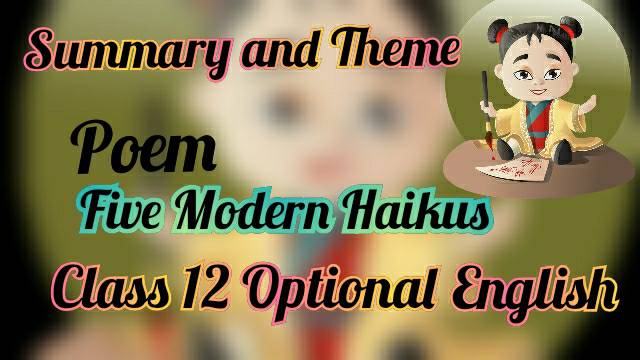Summary of Five Modern Haikus: Class 12 Optional English
What is Haiku?
Answer: Haiku is a unique form of poem. It doesn’t follow rhyme pattern. It was originated from Japan. It is Japanese poetic form. It has 17 syllables. It has three lines. First line contains five syllables. Second line contains seven syllables. Third line contains five syllables.
Theme of Five Modern Haikus
Five Modern Haikus brings different themes. Most of the haikus bring the theme of beauty of nature. Nature continues its own journey like human beings.
Summary of First Haiku by Richard Wright
The first haiku presents beautiful natural scene. The setting is branches of an apple tree. We can see an apple blossom. Bees are busy with sucking nectar from apple flowers. Branches are shaking due to the weight of bees.
Summary of Second Haiku by Alexis Rotella
The second haiku also presents beautiful natural scene where we find beautiful winter season. The setting is by the window. A fortune teller lady is enjoying the winter rain from her window.
Summary of third Haiku by Huguette Ducharme
The third haiku captures the scene where a small baby is walking. The setting is morning time. We find the developing stage of the toddler. At the beginning, the baby walks two or three steps but later on we find him changing into a pedestrian (normal walking person). The baby is walking himself without the help of anyone.
Summary of fourth Haiku by Don Eulert
The third haiku captures the scene of frogs in desert. The setting is desert. Time is winter. Young frogs are jumping here and there in a desert in winter. They are jumping on sand. They are producing the same sound like their ancestors. They are producing ‘’Grak Grak’’ sound.
Summary of fifth Haiku by Ezra Pound
The fifth haiku captures the scene of crowded metro station where people are busy in their own work. The poet also presents the scene of wet branch. The poet captures the beauty of petals after rain. A metro train is passing. Passenger of the train can’t see clearly the people standing on the station because of the speed of the train. Flower petals are falling on the ground due rain. The poet compares the natural scene with human creation.

